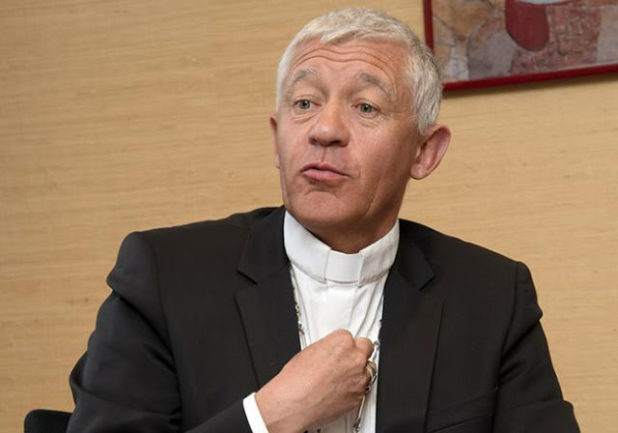Diversity Macht Frei
July 8, 2017
The archbishop of Strasbourg has decided to defy the political correctness that usually characterises the discourse of the French church.
“Abortion is not just permitted but promoted,” Mgr Luc Ravel says deploringly in the Dernières nouvelles d’Alsace. “It’s promoting it, and that I cannot accept, not for reasons of faith but because I love France,” he adds.
Then the archbishop, who graduated from the Polytechnic, does not hesitate to evoke “The Great Replacement”, the famous expression invented by the sulphurous writer Renaud Camus.
“The Muslim believers know very well that their fecundity is such that today, what do they call it? …the Great Replacement, they say to you very calmly, very positively, “but anyway, one day, all of that will be ours…”, says the former bishop of the military and the son of a general.
As I’ve discussed previously the phrase “The Great Replacement” was coined by the French novelist Renaud Camus who lost his publishing contract because of his support for Marine Le Pen. He was also convicted of inciting hatred for saying that Muslim criminals were “soldiers, not thugs” (link). See more about Camus here and here.
“The Great Replacement” has essentially the same meaning as “White Genocide” but the former has gained much broader acceptance than the latter. Generation Identity uses the phrase in their campaigning and publicity stunts, but, at least in France, it has also crept into the mainstream conversation in newspapers and talk shows.
Since our goal is to get ethnic Europeans to realise that they or their descendants are going to live as ethnic minorities if present trends continue, the import thing is to push this idea into public consciousness by whatever means. Since “Great Replacement” has proven its utility, it’s worth considering making broader use of it within English language discourse.
It’s clear that some people, even European ethno-nationalists, find “White Genocide” jarring, partly because they associate the word genocide with physical extermination. Personally, I’m not one of those people. Years ago, when I first came across the word genocide used in connection with the immigration-driven displacement of Europeans, I found it enormously thought-provoking.
But it’s clear that mainstream commentators, politicians and journos who might have some sympathy with the cause of European survival or are fully clued up about what is going on but hesitate to betray it publicly for fear of sanction – the likes of Douglas Murray, for example – might be willing to use “Great Replacement” where they would jib at “White Genocide”. Popularising “Great Replacement” might make it easier for them to break through the censorship barrier and communicate our ideas to a broader audience.
 Daily Stormer The Most Censored Publication in History
Daily Stormer The Most Censored Publication in History



